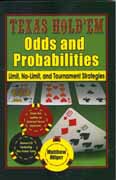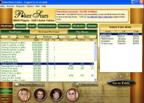Online Poker Mistakes
Playing Too Many Starting Poker HandsDrawing to Outs That Won't Help YouMiscalculating Odds with Two Cards to ComeCalling Raises Too Often on the TurnAlways Betting the RiverPlaying at Limits Too High in Relation to the BankrollOnline Poker Mistake - Not Paying AttentionOnline Poker Strategy Mistakes - Bluffing Too Much
Online Poker Mistake - Trying to Get Back to EvenOnline Poker Mistake: Playing Short-Handed with Little Experience
Texas Hold'em Odds and Probabilities
by Matthew Hilger
Even though the math behind the game of poker is fairly simple, some people still don't understand how to derive numbers and/or how to use them in action. Matthew Hilger, author of a best-selling book on playing poker on the Internet, takes the seemingly complex subject and breaks it down into usable information. He covers limit and no limit as well as tournament situations and focuses not just on how to calculate odds but also how to apply them to make better decisions. Because he uses everyday language and very few formula, his simple concepts and strategies mean you don't have to be a wiz in math. Illustrated with charts and diagrams, the book spans the math gap to cover the needs of the beginning, intermediate and the experienced player.
Read a review of Texas Hold'em Odds and ProbabilitiesPoker Stars
Poker Stars has reopened for most of the world, but not yet in the United States. It is endorsed by professionals like Daniel Negreanu and Chris Moneymaker. The site offers Texas Hold'em, Omaha, Omaha 8/b, 7 Card Stud, 7 Card Stud 8/b, Crazy Pineapple, Crazy Pineapple 8/b, Triple Draw, Royal Hold'em. Table limits range from penny games up to $300-600. The competition leans to the more challenging end of the spectrum.
Online Poker Strategy and Mistakes - Bluffing Too Much
There is nothing more glamorous and exciting than making a big bluff at the poker table. For the poker player, it doesn’t get much better than raking in a nice size pot with the worst poker Matthew Hilger is a professional poker player and respected author. In addition to the many articles on his own website, he writes columns for CardPlayer magazine, PokerPages.com and PokerinEurope.com. Matthew's next book, Texas Hold'em Odds and Probabilities: Limit, No-Limit and Tournament Strategies, will be released in June 2006. Matthew's website is www.internettexasholdem.com hand. For the poker player, satisfaction comes in knowing that you have outplayed your opponent.
Matthew Hilger is a professional poker player and respected author. In addition to the many articles on his own website, he writes columns for CardPlayer magazine, PokerPages.com and PokerinEurope.com. Matthew's next book, Texas Hold'em Odds and Probabilities: Limit, No-Limit and Tournament Strategies, will be released in June 2006. Matthew's website is www.internettexasholdem.com hand. For the poker player, satisfaction comes in knowing that you have outplayed your opponent.
 Matthew Hilger is a professional poker player and respected author. In addition to the many articles on his own website, he writes columns for CardPlayer magazine, PokerPages.com and PokerinEurope.com. Matthew's next book, Texas Hold'em Odds and Probabilities: Limit, No-Limit and Tournament Strategies, will be released in June 2006. Matthew's website is www.internettexasholdem.com hand. For the poker player, satisfaction comes in knowing that you have outplayed your opponent.
Matthew Hilger is a professional poker player and respected author. In addition to the many articles on his own website, he writes columns for CardPlayer magazine, PokerPages.com and PokerinEurope.com. Matthew's next book, Texas Hold'em Odds and Probabilities: Limit, No-Limit and Tournament Strategies, will be released in June 2006. Matthew's website is www.internettexasholdem.com hand. For the poker player, satisfaction comes in knowing that you have outplayed your opponent.Unfortunately, many poker players get themselves in trouble by bluffing too often. This is even truer on the Internet than in live games. Bluffing a lot is just not a profitable endeavor on the Internet, especially in the low-limit games where you frequently have hands go to showdowns.
There are two main reasons to try a bluff in poker. The obvious one is the immediate profit you gain on your successful bluffs. When playing observant opponents, it is also necessary to bluff occasionally so that you will get action in the future when you have solid hands. This is one of the key reasons for Gus Hansen’s success. He wins and loses a lot by all of his bluffs. It is those payoffs he gets when he has a real hand that makes him such a successful player. If you never bluff you won’t get paid off very often while a frequent bluffer will often be challenged. So it is the combination of the immediate profit gained and the advertising value you receive that makes bluffing profitable when done in the right spots.
Realize however that the Internet game is very different than live play. Bluffing on the Internet doesn’t have the same advertising value online as it does in a live game. First, many players don’t pay as much attention to the game online as they do in a casino and won’t even notice your bluffs. They might be playing two tables, watching television, or reading email. In addition, you rarely play with the same opponents very long on the Internet to take advantage of your “loose” image. You might try a bluff online and then 15 minutes later there are four or five new players sitting at your table. Of course, sometimes bluffing is needed in games where the players don’t move in and out of the game a lot or you are against regular opponents, but this is the exception rather than the rule on the Internet.
The bottom-line is that bluffs on the Internet generally only derive value from the particular hand you are playing. Since the advertising value of bluffs goes down, bluffing in general is less profitable on the Internet than in a live game.
Yet many players bluff too often on the Internet. I believe this is the result of two characteristics unique to the Internet. The virtual wall of the Internet makes many players play a little more deceptively than they would against a live opponent. Players gain a little more courage and confidence when they don’t have to look their opponents in the eye. The virtual environment also makes it easier to commit your chips to try a bluff. If you are contemplating a bluff, all it takes is one click of the mouse. Compare this to a live game where you have to physically move your chips into the center of the table while your opponents are watching you. Many players become careless with these “virtual” chips.
Be careful to not let these temptations guide your play. Also realize that since so many players like to bluff on the Internet, players will call your bluffs a little more often than they might in a live game. This is yet one more reason to be very selective with your bluffing.
In fact, in most low-limit games, profitable bluffing opportunities are far and few between. The best times to try your bluffing tactics are in the short-handed games and the tight high-limit games. Of course there are always times that you might be presented with a profitable bluffing opportunity but just be sure that you evaluate the situation very carefully.
The next article will look at Mistake #9: Trying to Get Back to Even
[ learn to play poker! ]

